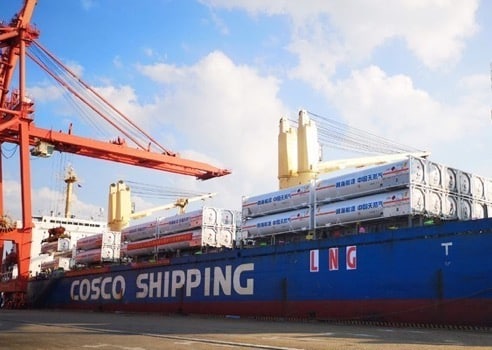COSCO targeted by the Pentagon over alleged ties to the
COSCO and Other Chinese Firms Blacklisted by Pentagon

The U.S. Department of Defense has recently expanded its blacklist of companies with alleged ties to the People’s Liberation Army (PLA). Among the notable names on this list is COSCO, the world’s largest shipping company. This move reflects ongoing tensions between the United States and China, particularly in the realm of military and economic competition. Being placed on this blacklist does not impose direct penalties. However, it serves as a significant deterrent for U.S. firms considering partnerships or business dealings with these companies. The Pentagon’s actions signal a broader strategy to limit China’s influence in global shipping and military logistics.
The inclusion of COSCO on this list is not an isolated incident. Other major Chinese firms, such as China State Shipbuilding Corp (CSSC) and China National Offshore Oil Corporation (CNOOC), have also been identified as military entities. This trend highlights the U.S. government’s increasing scrutiny of Chinese companies, particularly those in strategic industries. The implications of these actions extend beyond corporate reputations; they could reshape the landscape of international trade and shipping.
Impact on the Shipping Industry
The Pentagon’s blacklist has significant ramifications for the shipping industry, particularly for companies like COSCO. Being labeled as a military entity can discourage U.S. businesses from engaging with these firms. This could lead to reduced opportunities for collaboration and investment. For COSCO, this is not the first time it has faced scrutiny from Washington. In 2019, the company was sanctioned for transporting Iranian oil, which caused a dramatic spike in Very Large Crude Carrier (VLCC) rates, reaching as high as $200,000 per day.
The current situation may lead to similar market disruptions. U.S. firms may become hesitant to work with COSCO and other blacklisted companies, fearing potential backlash from the government. This could create a ripple effect throughout the shipping industry, impacting freight rates and availability. Furthermore, the blacklist may prompt other countries to reconsider their relationships with these Chinese firms, potentially isolating them in the global market.
Additionally, the blacklisting of major players like China International Marine Containers (CIMC) and China Communications Construction Group could hinder their ability to secure contracts and partnerships internationally. As these companies navigate the complexities of being on the Pentagon’s list, they may need to adapt their business strategies to mitigate the impact on their operations.
Broader Geopolitical Implications
The inclusion of COSCO and other Chinese firms on the Pentagon’s blacklist is part of a larger geopolitical strategy. The U.S. government aims to curb China’s growing influence in various sectors, particularly those related to defense and technology. This move is indicative of a broader trend where national security concerns are increasingly intertwined with economic policies.
The implications of this blacklist extend beyond the shipping industry. It reflects a growing apprehension in Washington regarding China’s military ambitions and its potential to leverage commercial enterprises for strategic gains. As the U.S. continues to scrutinize Chinese companies, it may lead to further tensions in trade relations. This could result in retaliatory measures from China, further complicating the already fraught U.S.-China relationship.
